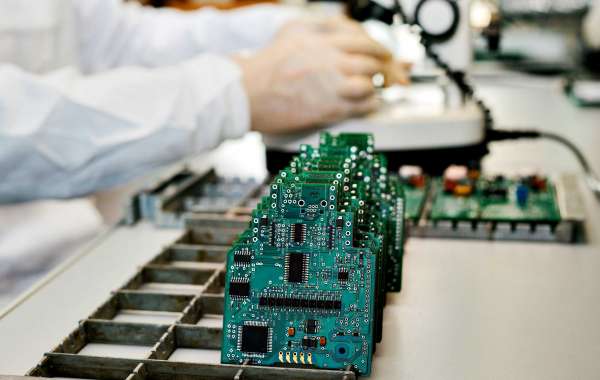The vast landscape of technological innovation, one city stands out as a hub for semiconductor excellence - Austin, Texas. Known as the "Silicon Hills," Austin has become a thriving ecosystem for the semiconductor industry, hosting major players, fostering innovation, and contributing significantly to the global tech landscape. This blog post will delve into the vibrant Semiconductor Industry in Austin, exploring its history, key players, and the factors that have propelled this Texan city into the forefront of semiconductor innovation.
Austin's Semiconductor Roots:
The semiconductor industry in Austin traces its roots back to the 1960s when technology companies recognized the potential of the region. Over the decades, Austin has evolved from a modest tech presence to a major player in the global semiconductor arena. The city's journey is marked by a confluence of factors, including a skilled workforce, a supportive business environment, and strategic investments in research and development.
Key Players in Austin's Semiconductor Scene:
- Samsung Austin Semiconductor
One of the key pillars of the semiconductor industry in Austin is Samsung Austin Semiconductor. Established in 1997, Samsung's presence in Austin has significantly contributed to the city's status as a semiconductor powerhouse. The company's state-of-the-art manufacturing facilities and commitment to innovation have played a crucial role in shaping Austin's reputation in the global semiconductor market.
- Intel Corporation
Intel, a giant in the semiconductor industry, has a notable presence in Austin. The company's commitment to advancing technology and pushing the boundaries of innovation is reflected in its Austin operations. With a focus on research and development, Intel has been a driving force in shaping the future of semiconductor technology in the city.
- Advanced Micro Devices (AMD)
AMD, another major player in the semiconductor industry, has a significant footprint in Austin. Known for its cutting-edge processors and graphics technology, AMD's presence has added to the diversity and vibrancy of Austin's semiconductor landscape. The company's commitment to pushing the boundaries of high-performance computing has made it a key contributor to Austin's tech prowess.
- NXP Semiconductors
NXP Semiconductors, a global leader in secure connectivity solutions, has a substantial presence in Austin. The company's focus on creating secure and efficient semiconductor solutions aligns with the evolving needs of the tech industry. NXP's contributions to Austin's semiconductor ecosystem have further solidified the city's position as a hub for innovation.
The Ecosystem Collaborations and Partnerships:
A unique strength of Austin's semiconductor industry lies in its collaborative ecosystem. The city fosters a culture of collaboration, with companies, research institutions, and startups working together to push the boundaries of technology. This collaborative spirit has led to the formation of industry consortia, research partnerships, and innovation hubs, creating a dynamic environment for semiconductor advancement.
- University Collaborations
Austin's universities, including the University of Texas at Austin, play a vital role in shaping the semiconductor talent pool. Collaborations between industry players and academic institutions ensure a steady influx of skilled professionals into the semiconductor workforce. Research initiatives and academic-industry partnerships contribute to the city's reputation as a center for cutting-edge research and development.
- Startups and Innovation Hubs
The city's semiconductor landscape is not only shaped by industry giants but also by a thriving community of startups and innovation hubs. These dynamic entities contribute to the ecosystem by bringing fresh ideas, agile development processes, and niche expertise. Austin's supportive environment for startups has led to the emergence of disruptive technologies that complement the offerings of established semiconductor players.
Austin's Competitive Edge:
Several factors contribute to Austin's competitive edge in the semiconductor industry.
- Skilled Workforce
Austin boasts a highly skilled and diverse workforce, thanks in part to its renowned educational institutions and a culture that attracts top talent. The city's ability to attract and retain skilled professionals has been a key factor in the success of its semiconductor industry.
- Business-Friendly Environment
Texas, in general, is known for its business-friendly environment, and Austin is no exception. Favorable tax structures, regulatory policies, and a supportive business ecosystem create an environment conducive to the growth of the semiconductor industry. This business-friendly atmosphere has attracted major players and startups alike to establish and expand their operations in the city.
- Quality of Life
Austin's quality of life is a significant draw for professionals in the semiconductor industry. The city's vibrant culture, outdoor amenities, and diverse entertainment options contribute to a high quality of life for residents. This, coupled with a booming tech scene, makes Austin an attractive destination for those looking to build a career in the semiconductor field.
Future Trends and Challenges:
As the semiconductor industry in Austin continues to evolve, several trends and challenges are shaping its trajectory.
- Advancements in Process Technology
The relentless pursuit of smaller, more efficient semiconductor components continues to drive innovation in Austin. Advancements in process technology, including developments in nanotechnology and materials science, are expected to shape the future of the semiconductor industry in the city.
- Global Supply Chain Dynamics
The semiconductor industry is inherently global, and Austin's players are not immune to the challenges posed by global supply chain dynamics. Navigating issues such as semiconductor shortages and geopolitical tensions requires strategic planning and collaboration within the industry.
- Emerging Technologies
The integration of emerging technologies, such as artificial intelligence, 5G, and the Internet of Things (IoT), presents both opportunities and challenges for Austin's Semiconductor Industry. Companies in the city are at the forefront of developing solutions that harness the power of these technologies, but staying ahead requires continuous innovation and adaptation.
Conclusion:
The semiconductor industry in Austin, Texas, is a dynamic and thriving ecosystem that has carved out a prominent place in the global tech landscape. With major players like Samsung, Intel, AMD, and NXP, coupled with a collaborative ecosystem, skilled workforce, and a business-friendly environment, Austin is set to remain a key player in shaping the future of semiconductor technology. As the industry continues to evolve, the Silicon Hills of Austin will likely continue to be a beacon of innovation, driving the next wave of technological advancements.








